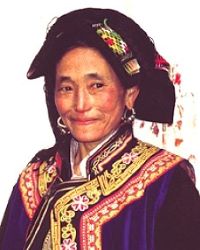Jiarong, Situ in China

Photo Source:
Copyrighted © 2026
Operation China, Asia Harvest All rights reserved. Used with permission |
Send Joshua Project a map of this people group.
|
| People Name: | Jiarong, Situ |
| Country: | China |
| 10/40 Window: | Yes |
| Population: | 205,000 |
| World Population: | 205,000 |
| Primary Language: | Jiarong |
| Primary Religion: | Buddhism |
| Christian Adherents: | 0.03 % |
| Evangelicals: | 0.03 % |
| Scripture: | Portions |
| Ministry Resources: | No |
| Jesus Film: | No |
| Audio Recordings: | Yes |
| People Cluster: | Tibetan |
| Affinity Bloc: | Tibetan-Himalayan Peoples |
| Progress Level: |
|
Introduction / History
Until 1949 the Jiarong were divided into 18 small kingdoms. They kept the Chinese military at bay for ten years during the eighteenth century. The Jiarong languages suggest that they may have originally been part of the Qiang group who, after many generations of contact with Tibetans, became a distinct people.
The name Situ "refers to the traditional territory of the four chieftaincies of Zhuokeji, Suomo, Songgang and Dangba in the heartland of Jiarong country. The term is adopted since it is now a widely used local label for this language." The several Jiarong groups in China have been officially counted under the Tibetan nationality by the Chinese authorities. The Jiarong, however, speak their own distinct languages and believe they are ethnically and historically different from the Tibetans. They have been listed as one of the people groups in China that "need further investigation."
The classification of Jiarong has baffled Chinese scholars. "The languages of the Jiarong who live in Aba and Garze areas of Sichuan are a puzzle. Their language is different from Tibetan in terms of grammar, and akin to the Qiang and Pumi languages. They are considered the 'language bridge' between Tibetan and Burmese." Differences in the five Jiarong languages are great.
What Are Their Lives Like?
The majority of Situ Jiarong are farmers, herding livestock and growing crops along the river basins in central Sichuan. A number of urban Jiarong are merchants and shop owners.
What Are Their Beliefs?
Almost all Jiarong farther to the west are Tibetan Buddhists, but many of the Situ Jiarong have adopted the polytheistic practices of the Qiang.
The Jiarong were first focused on in the early 1900s by the American Baptists - who had a mission base at Ya'an - and by the Border Mission of the Church of Christ in China in the 1910s. One writer summarized their efforts: "In the early half of this century some missionaries stationed in areas relatively close to the Jiarong took some trips into Jiarong territory. This led to the translation of some tracts. It was not until the 1930s that an effort to specifically learn and analyze the Jiarong language got underway. A draft translation of the book of Jonah was in progress when the invasion of the Red Army in 1936 made work impossible. All materials were lost in the war.
What Are Their Needs?
Without the guidance of Christ, these people will be lost in this life and the life to come. They need Christ-bearers to go to them.
Prayer Points
Pray for ministers and missionaries to be called to serve the Situ Jiarong, so that the Kingdom of God continues to expand extensively within this people group.
Pray for a movement of Christ to arise, so may the Situ Jiarong already have softened hearts to receive the invitation of God's truth.
Pray for the Lord to provide for their needs as a testimony of his power and love.
Pray that the Situ Jiarong people will have a spiritual hunger that will open their hearts to the King of kings.